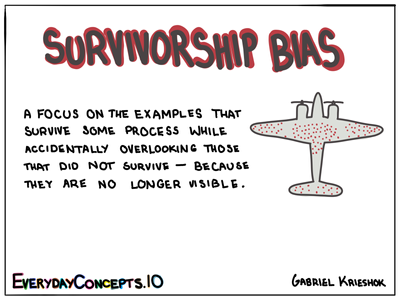Survivorship Bias

Category
Definition
A focus on the examples that survive some process while accidentally overlooking those that did not survive — because they are no longer visible.Origin
The example of using statistics of minimizing bomber losses to enemy fire in World War II was developed by statistician Abraham Wald, who noticed that they were only evaluating the the damage to planes that had survived, and thus skewed their analysis, as opposed to all bomber planes (and in particular, the ones that were shot down, did not return, and could not be studied for evaluation).